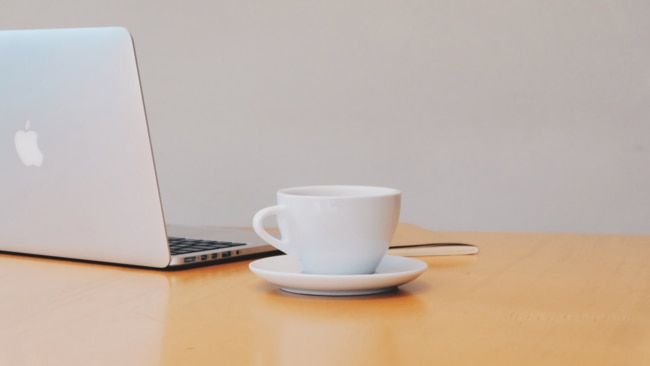This is the best time of day to drink coffee to boost your productivity
And no, it's not first thing

Lifestyle
Don't miss out on the headlines from Lifestyle. Followed categories will be added to My News.
While most of us reach for a coffee as soon as our eyes are open, research suggests this might not necessarily result in us feeling more awake.
We all know it and most of us love it, but more is not always more when it comes to our caffeine intake. Many of us instinctively know that there is a limit to how much caffeine we should consume, lest we deal with unpleasant side effects and potential medical complications.
Current recommendations in Australia set a safe limit of 400mg of caffeine per day. That’s the equivalent of a bit under three espresso shots or eight cups of black tea.
While there is a limit on how much we can safely consume of this magical elixir, it’s possible to harness our body’s natural biological rhythms and time our caffeine intake to give us a boost of energy when we need it most.

Like what you see? Sign up to our bodyandsoul.com.au newsletter for more stories like this.
How caffeine works
The key to timing your caffeine intake is first understanding how caffeine works. The alertness that many feel after consuming caffeine largely comes from its ability to block adenosine receptors in your brain.
Adenosine is a neurotransmitter that promotes sleep. Our adenosine levels are typically lowest in the morning and rise gradually throughout the day. It is thought that the act of sleeping clears our adenosine levels, ready to build again the following day.
When we consume caffeine, we limit the action of adenosine, and this can make us feel more alert. However, it’s only a temporary measure – caffeine blocks the action of adenosine, but it doesn’t clear it from your body.
This means that once the caffeine wears off, you will have a “backlog” of adenosine just waiting to bind with your brain’s receptors. This is part of the reason some people report feeling a “crash” after their caffeine wears off.
The hormone cortisol, which is produced by our adrenal glands, also plays a role in regulating our energy levels. Your cortisol levels are strongly related to how alert you are – we tend to get a spike in our cortisol levels around the time of waking, which makes us feel more alert, followed by a decline during waking hours.
Caffeine consumption increases our cortisol levels, which helps increase our energy levels, however, this effect is reduced as our caffeine tolerance increases.

Why you should delay your morning coffee
In the first couple of hours after you wake up, your adenosine levels are at their lowest, while your cortisol levels are at their highest. This is our body’s way of making us alert and ready to face the day. If we add caffeine into the mix at the same time, it’s going to do a few things:
- Create a greater peak in your energy levels, but what comes up must come down – your natural lows in energy may feel even lower by comparison.
- Give you less bang for your buck - there are limits to how much alertness one person can experience at a given time, and if you consume caffeine while you’re already at peak alertness there is a chance you won’t get any extra energy, just jitters.
- Increase your caffeine tolerance, meaning you will need more caffeine over time to get the same effects. And that can increase your likelihood of experiencing negative side effects.
When to stop drinking coffee
While caffeine can start exerting its effects on your body in as little as 15 minutes, it takes much, much longer to be excreted from your system.
We all respond differently to the ingestion of caffeine, and this is largely related to our caffeine consumption habits, our genetics and our body weight. Some people can clear caffeine from their system within a few hours, while others take more than nine hours to clear half of it.
The only way to know how long your body takes to clear caffeine is to experiment with different doses and timing and see how you feel. A good rule of thumb is to avoid caffeine consumption after around 2pm, to ensure you’ve cleared a good amount from your system before trying to go to sleep.

Can you build up a tolerance to coffee?
Your caffeine tolerance will depend on many factors relating to your biology as well as your caffeine consumption habits. Those who consume caffeine more often and in larger doses tend to tolerate more caffeine than those who do not.
The more caffeine you consume, the more caffeine you will need to exert its beneficial effects, but as the dose increases so too does the risk of negative side effects such as jitteriness, anxiety, reflux and sleep disturbance. A “less is more” approach is best when it comes to caffeine.
The best time of day to drink coffee
If you want to ensure consistent energy levels and maximum productivity throughout the day, try to hold off on your first caffeinated beverage until an hour or two after waking.
This is going to help prevent an unsustainable high in energy levels and, more importantly, the crashing low that inevitably follows. This also means that you can “save up” your caffeine until a little bit later in the morning, making that 400mg limit last longer.
Instead of going straight for a strong cup of coffee, try exposing yourself to some natural light (open a window, even go outside if you can) and even start the day with some movement. You’ll find that your body is more responsive to these gentler methods of energy stimulation during the early hours of the day, and they won’t come with the same crash caffeine tends to.
Consume your first caffeine a couple of hours after waking, just when energy levels are starting to dip. This will help extend your window of productivity, without consuming excessive caffeine and giving way to jitteriness.
It might sound boring, but the absolute best way to ensure consistent energy levels is to get a good night’s sleep. So, enjoy your caffeinated beverages throughout the day, but aim to stop by mid-afternoon. You will have to test what cut-off time you need personally, but if doubt, start with 2pm and see how that impacts your sleep. Bring that cut-off time earlier if needed.
By ensuring that your caffeine intake does not disrupt your sleep cycle, you’re going to find you need less caffeine to feel energised. This will in turn reduce your tolerance which means that it will work when you need it to!
Ashleigh Jones is an Accredited Practising Dietitian and leads a team of dietitians at Lite n’ Easy. She is known for her practical, no-BS approach to healthy eating and her experience in helping patients with IBS. You can follow her on Instagram here.
More Coverage
Originally published as This is the best time of day to drink coffee to boost your productivity




